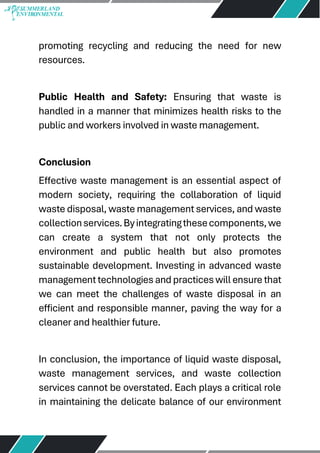The Best Guide To Reclaim Waste
The Best Guide To Reclaim Waste
Blog Article
The Buzz on Reclaim Waste
Table of ContentsWhat Does Reclaim Waste Mean?The Greatest Guide To Reclaim WasteSome Ideas on Reclaim Waste You Need To KnowReclaim Waste for BeginnersReclaim Waste Fundamentals Explained
Explore the kinds, incidents, and kinds of fluid waste. Residential sewage waste refers to the waste and items from a domestic septic system. This kind of waste is produced by human beings in residences, institutions, and various other buildings. This only includes septic systems that have a drainpipe area. The correct administration and disposal of domestic sewage waste call for fluid waste to be moved to a sewer treatment plant where the appropriate methods and equipment are put on cleanse and deal with waste.
Commercial waste typically includes possible threats, such as combustible products or a combination of fluid and solid waste items, and needs an advanced and detailed disposal process. The disposal of commercial waste typically involves the filtering of waste before transport to make sure safe and correct disposal. Industrial waste is developed from by-products and runoff of commercial procedures and manufacturing.
This sort of waste can not utilize the very same sewage monitoring transport or processes as septic or commercial liquids. The commercial waste administration process requires the inspection and screening of fluid waste prior to it undergoes the disposal process (industrial wastewater treatment). Runoff waste is the fluid waste that comes from drainage and excess stormwater in highly booming areas or cities
Runoff waste can create contamination and flooding otherwise managed properly. Discover more regarding sewage system cleaning and waste monitoring. Making sure proper waste administration can stop disasters and decrease ecological damage. Both individuals in residential setups and specialists in commercial or production markets can gain from understanding the procedures and regulations of liquid waste monitoring.
Indicators on Reclaim Waste You Should Know
Get in touch with PROS Solutions today to find out concerning our waste monitoring and disposal solutions and the appropriate methods to take care of the liquid waste you generate.
(https://www.ted.com/profiles/48198485/about)This supposed 'wastewater' is not only an essential resource but, after therapy, will be released to our land, waterways or the ocean. Made use of water from commodes, showers, baths, kitchen area sinks, laundries and commercial processes is known as wastewater.

water utilized to cool down equipment or clean plant and tools). Stormwater, a type of wastewater, is drainage that moves from agricultural and urban locations such as roof coverings, parks, gardens, roadways, courses and rain gutters right into stormwater drains, after rainfall. Stormwater streams untreated straight to local creeks or rivers, ultimately reaching the ocean.
Fascination About Reclaim Waste
In Queensland, a lot of wastewater is treated at sewage treatment plants. Wastewater is delivered from domestic or industrial websites through a system of drains and pump stations, understood as sewage reticulation, to a sewage therapy plant. Regional governments construct, preserve and operate most sewer therapy plants. Operators are certified under the Environmental Management Act 1994 to discharge treated wastewater at an acceptable environmental standard into waterways.
The Department of Natural Resources suggests city governments about managing, operating and Continue keeping sewage systems and therapy plants. In unsewered locations, local governments might need owners to mount individual or home sewage therapy systems to treat residential wastewater from bathrooms, cooking areas, restrooms and washings. The Department of Natural Resources authorizes making use of home systems when they are proven to be efficient.
Many stormwater obtains no therapy. In some brand-new communities, treatment of some stormwater to remove trash, sand and gravel has actually begun utilizing gross toxin catches. Wastewater treatment takes place in 4 stages: Gets rid of solid matter. Bigger solids, such as plastics and various other objects mistakenly released to sewage systems, are removed when wastewater is travelled through screens.
Uses little living microorganisms recognizes as micro-organisms to damage down and eliminate remaining liquified wastes and great bits. Micro-organisms and wastes are integrated in the sludge.
Reclaim Waste Things To Know Before You Get This
Nutrient elimination is not available at all sewage treatment plants due to the fact that it calls for expensive specialized devices. Clear fluid effluent created after therapy might still include disease-causing micro-organisms - liquid waste removal melbourne.

The majority of wastewater moves right into the sewage system. Under the Act, local federal governments carry out authorizations and permits for environmentally appropriate tasks (Periods) including wastewater launches that might have a local impact.
Reclaim Waste - Truths
Surveillance offers valid info about water high quality and can verify that permit conditions are being fulfilled. The details obtained via tracking offers the basis for making water high quality decisions.
Report this page